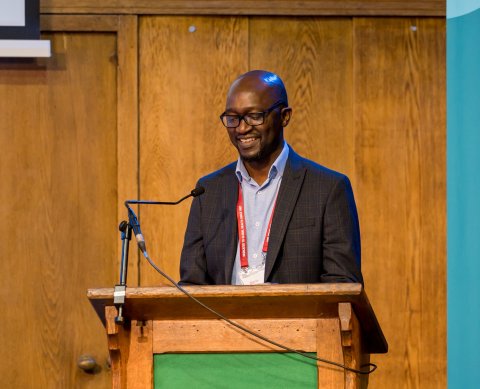Dr Bern-Thomas Nyang’wa: Yes we can! Cure drug-resistant tuberculosis in six months!

World TB Day is taking place on 24 March and this year’s theme is: Yes! We can end TB. Bern-Thomas Nyang’wa (MB; BS, MPH [Int]), a Malawian doctor with extensive MDR-TB and humanitarian health experience and the Medical Director of Médecins sans Frontières, looks in this blog at how it is possible to cure drug-resistant tuberculosis in six months.
A deadly disease
Tuberculosis remains one of the deadliest infectious diseases in the world (only second to COVID), causing illness in 10.6 million people and taking 1.3 million lives in 2022 alone . Multi-drug resistant tuberculosis, caused by bacilli that can not be cured by two of the most potent anti-TB medicines – rifampicin and isoniazid, is a public health crisis. Around half a million people fall ill annually to this type of TB, only 40% access treatment and of those, only 60% are cured after an arduous treatment course lasting between nine and eighteen months of up to twenty pills daily.
Short oral treatment is available
In November 2022, the World Health Organization recommended a six months all-oral BPaLM regimen for the treatment of rifampicin resistant tuberculosis. This was principally informed by the results of a ten-year research project led by Médecins sans Frontières – the TB-PRACTECAL trial. In this study, we demonstrated that five to seven pills daily for six months of a regimen consisting of bedaquiline, pretomanid, linezolid and moxifloxacin (BPaLM) was superior to the standard of care. This treatment is not only more effective and safer, but patients also feel better quicker, and it is more cost-effective.
Patients need short treatments now!
Despite this exciting scientific breakthrough, and rapid global policy change demonstrated by the release of guidelines by the world health organisation within a couple of months of getting the clinical trials data, many adults falling ill with rifampicin resistant tuberculosis are yet to have access to this treatment. Campaigns by activist groups such as the Treatment Action Group and calls to action campaigns need to intensify to make access to this new regimen an urgent global health issue.
National TB programmes – Yes! you can switch to BPalM.
Civil society and affected communities – Yes! You can demand BPaLM
Don’t leave mothers and children behind!
Current rifampicin resistant treatment recommendations exclude children, pregnant and lactating mothers due to limited safety evidence of these regimens. Real world data supporting their use is accumulating and other short regimens are being studied in these populations.
Researchers – Yes! You can ensure pregnant and lactating mothers are not excluded in your studies.
Technical assistance organisations and donors – Yes! You can support the scale-up of short all-oral regimens.
The future holds promise.
Drug resistant TB is not defeated yet. Although these are new regimens, many of the drugs including bedaquiline, have been in use for over ten years and resistance has started developing. There is however continued excitement in the TB world as a full TB drugs development pipeline, offers hope for even shorter treatment regimens in the near future. So Yes! Together we can end TB.
Biography
Bern-Thomas Nyang’wa (MB; BS, MPH [Int]) is a Malawian doctor with extensive MDR-TB and humanitarian health experience. He is currently the Medical Director of Médecins sans Frontières and is an honorary Associate Professor at the Centre for Global Health of University College London. He is a recipient of the 2022 Stephen Lawn TB/HIV Research Leadership prize, and was the Chief Investigator of TB-PRACTECAL clinical trial which was pivotal in the change to the WHO 2022 rifampicin resistant guidelines.
Bern-Thomas Nyang'wa: getting things done in TB and HIV - The Lancet
